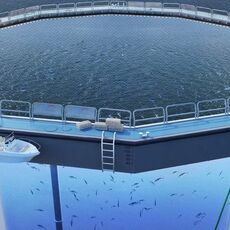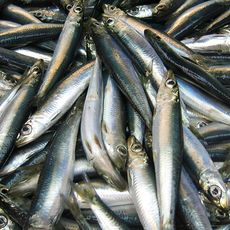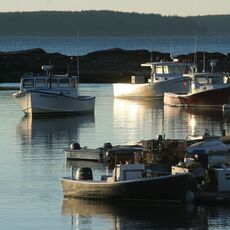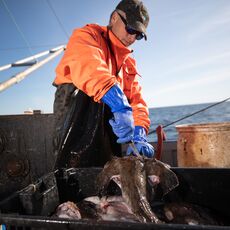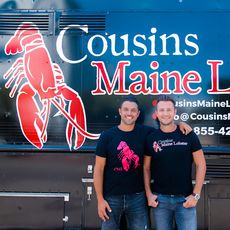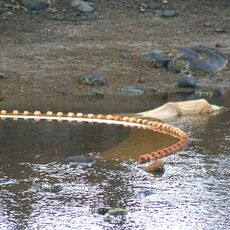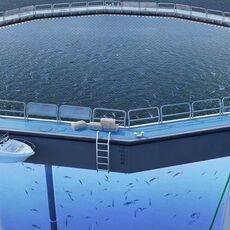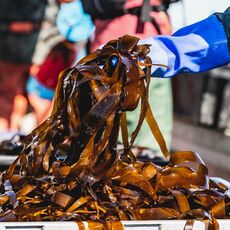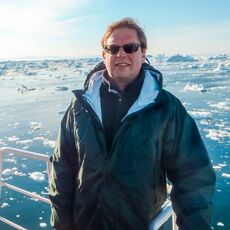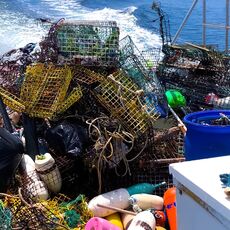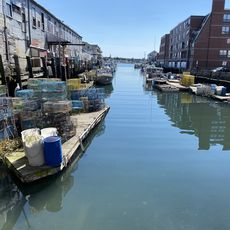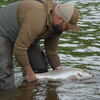Processing Your Payment
Please do not leave this page until complete. This can take a few moments.
- News
-
Editions
View Digital Editions
Biweekly Issues
- Nov. 17, 2025
- November 03, 2025
- October 20, 2025
- October 6, 2025
- September 22, 2025
- September 8, 2025
- + More
Special Editions
- Lists
- Viewpoints
-
Our Events
Event Info
Award Honorees
- Calendar
- Biz Marketplace
Fisheries & Marine
-
Scrappy small businesses: Despite labor shortages and supply chain issues, there’s optimism
Laurie Schreiber Updated: May 16, 2022Many small businesses are looking beyond the pandemic with a sense of excitement. There's a vigorous spirit in Maine's small-business community, despite difficulties including staffing shortages and supply chain woes.
Laurie Schreiber Updated: May 16, 2022Next move remains unclear for proposed Frenchman Bay salmon farm
Laurie Schreiber May 11, 2022It’s too soon to speculate how the Norwegian company proposing the operation will proceed after the state nixed its applications last month, said a project manager.
Laurie Schreiber May 11, 2022Maine Port Authority promotes interim leader to executive director
Jessica Hall May 9, 2022Matthew Burns, former deck officer and Maine Maritime Academy graduate, is now executive director of the Maine Port Authority after serving in an interim role for the past year.
Jessica Hall May 9, 2022Federal disaster declaration allocates $7M for Maine herring industry
Staff Updated: May 9, 2022Since 2019, catch limits have been reduced by more than 80%. The money will assist fishermen and marine businesses, and can be used for activities including vessel buybacks and job retraining.
Staff Updated: May 9, 2022Maine’s 2021 seafood harvest bests all-time record by over 20%
Jessica Hall May 4, 2022The 2021 harvest of $891 million topped the previous overall record set in 2016 of $734 million.
Jessica Hall May 4, 2022Fishermen’s association triples community investments in five years
Laurie Schreiber Updated: May 4, 2022The Maine Coast Fishermen's Association has expanded its donor base, income and community programs. Fishermen Feeding Mainers represents $500,000 raised and spent in 2021 alone.
Laurie Schreiber Updated: May 4, 2022Cousins Maine Lobster expands in franchising frenzy
William Hall April 28, 2022With a half dozen new locations planned this quarter, the business that began a decade ago with a single food truck now spans the country. Despite its California headquarters, the company does have Maine roots.
William Hall April 28, 2022Maine's most lucrative fishery closes the season at an eye-popping $2,100 a pound
Jessica Hall April 25, 2022The average per pound value this year has also exceeded $2,000 per pound, which has only happened three other times in the history of the fishery, the Department of Marine Resources said.
Jessica Hall April 25, 2022State nixes applications for large salmon farm on Frenchman Bay
Laurie Schreiber April 21, 2022The Department of Marine Resources cited American Aquafarms' failure to meet criteria for a proposed source of young salmon. But the company can submit a new application. “We should not assume the fight is over,” said Friends of Acadia.
Laurie Schreiber April 21, 2022Island oyster farm wins judge’s award in Mount Desert Business Boot Camp
Laurie Schreiber April 20, 2022The bootstrap oyster-growing operation off the Cranberry Isles will plant 300,000 oyster seeds this year. It takes four years to grow a crop.
Laurie Schreiber April 20, 2022Gouldsboro seaweed farmer gets $650K to develop new cultivation systems
Staff April 15, 2022Springtide Seaweed will refine its nursery technologies to enable production of high-value nori and dulse red seaweed.
Staff April 15, 2022York County sea farmer collaborates with Ocean Spray on product using 'upcycled' seed
Laurie Schreiber April 6, 2022Ocean Spray helped Atlantic Sea Farms think through its design of a new processing facility to work collaboratively on nutritional testing.
Laurie Schreiber April 6, 2022Maine aquaculture leader steps onto national stage
Laurie Schreiber April 5, 2022Maine is viewed as a case study in how to do aquaculture right, says Sebastian Belle. National challenges include animal health, federal regulation, and cross-species and production method issues — all relevant to Maine growers.
Laurie Schreiber April 5, 2022Unity College partners with international group to train staff in 'ocean justice'
Laurie Schreiber April 4, 2022The initiative comes at a time when many students no longer want to spend the time and money it takes to complete a baccalaureate program but seek career training.
Laurie Schreiber April 4, 2022Mills announces $16M in pandemic relief for Maine seafood businesses
Renee Cordes Updated: April 1, 2022Eligible uses for funds from the Maine Seafood Dealer and Processors COVID-19 Response and Resilience Program include payroll costs and expenses and rent or mortgage payments.
Renee Cordes Updated: April 1, 2022Whole Oceans moves closer to Bucksport salmon farm construction
Jessica Hall March 31, 2022The company is moving forward with site preparation work for its facility to raise Atlantic salmon at the former Verso paper mill in Bucksport.
Jessica Hall March 31, 2022
Today's Poll
Sponsored by Kennebunk Savings Bank
For many, Thanksgiving means gathering with family and friends. It can also mean travel headaches.
AAA predicts a record 81.8 million people will travel at least 50 miles from home between Tuesday, Nov. 25, and Monday, Dec. 1.
Of those travelers, 73 million will go by car — up 1.3 million from a year ago.
With the federal shutdown resolved, air travel is expected to be back at normal levels — although, in this case, it will mean normal Thanksgiving levels. AAA predicts that 6 million people will travel by air, a 2% increase. (Last year, Portland International Jetport broke its Thanksgiving travel record, with 64,348 travelers, up from 54,636 in 2023.)
Another 2.5 million people will travel by bus, train or cruise ship.

The Giving Guide
The Giving Guide helps nonprofits have the opportunity to showcase and differentiate their organizations so that businesses better understand how they can contribute to a nonprofit’s mission and work.
Learn More
Work for ME
Work for ME is a workforce development tool to help Maine’s employers target Maine’s emerging workforce. Work for ME highlights each industry, its impact on Maine’s economy, the jobs available to entry-level workers, the training and education needed to get a career started.
Learn More
Groundbreaking Maine
Whether you’re a developer, financer, architect, or industry enthusiast, Groundbreaking Maine is crafted to be your go-to source for valuable insights in Maine’s real estate and construction community.
Learn more-
The Giving Guide
The Giving Guide helps nonprofits have the opportunity to showcase and differentiate their organizations so that businesses better understand how they can contribute to a nonprofit’s mission and work.
-
Work for ME
Work for ME is a workforce development tool to help Maine’s employers target Maine’s emerging workforce. Work for ME highlights each industry, its impact on Maine’s economy, the jobs available to entry-level workers, the training and education needed to get a career started.
-
Groundbreaking Maine
Whether you’re a developer, financer, architect, or industry enthusiast, Groundbreaking Maine is crafted to be your go-to source for valuable insights in Maine’s real estate and construction community.
ABOUT
NEW ENGLAND BUSINESS MEDIA SITES
No articles left
Get access now
In order to use this feature, we need some information from you. You can also login or register for a free account.
By clicking submit you are agreeing to our cookie usage and Privacy Policy
Already have an account? Login
Already have an account? Login
Want to create an account? Register
This website uses cookies to ensure you get the best experience on our website. Our privacy policy
To ensure the best experience on our website, articles cannot be read without allowing cookies. Please allow cookies to continue reading. Our privacy policy

